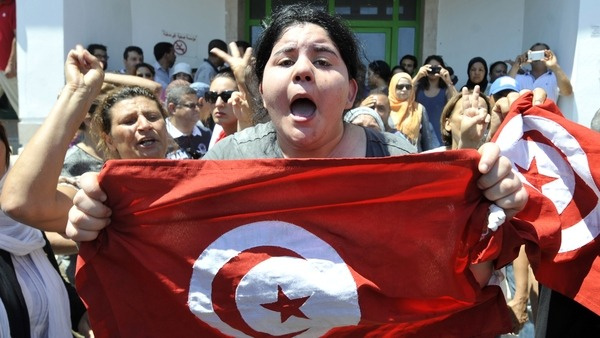Fatal Blow to Ennahda

The assassination of Mohammad al-Brahimi, one of the most famous opponents of Tunisia’s Islamist government, could be a fatal blow to the Ennahda movement and the Muslim Brotherhood’s Tunisia branch. The blood of this opponent which was ruthlessly and mercilessly spilled on the ground in front of the eyes of his family may lead the moderate Islamist government of Tunisia to the same fate as that of Mohammad Morsi and his Islamist government in Egypt.
There are two possibilities; either this assassination was planned on the basis of a conspiracy and the skillful plotting of domestic or foreign groups that oppose the presence of the Islamists in power and whose intention is to provoke people’s sentiments and bring them to the streets in order to implement a similar scenario to that of Egypt; or it is the result of the mismanagement and incapability of the government in maintaining security and running the country and closing the door on the implementation of such a skillful scenario which, due to the lack of professional intelligence and security structures, may have employed some of the radical Islamists affiliated to Ennahda or supported by it, like the Salafis, or deceived them into entering the scene.
In either case, the present conditions are the best situation for the opponents of Tunisia’s Islamist government and the result is certain. Now the angry people who have poured into the streets in different regions of the country including Sidi Bouzid have already issued their verdict with regard to Ghannouchi’s Ennahda movement and the Islamist government of Ali Laarayedh and are ready to execute it.
No one would wait for the innocence of the ruling Islamists to be proven. There is no time to find the murderers of a well-known opposition personality and the real planners of this assassination who might have been trapped in the deceptive game and complex plan of foreign intelligence and security organizations. Ennahda might not be able to find time to prove that this assassination was a skillful plot to create chaos in a country which has not yet overcome the disorder caused by the revolution.
There is no doubt that the government is responsible in this incident for any reason, either lack of experience or the infiltration of undesirable elements or those related to foreign intelligence services. They should have learned a lesson from the previous assassination last February whose target was Chokri Belaid, another famous opposition leader, and prevented the next one.
Now anger has blinded the wisdom and sentiments of the protesting people and prepared the ground for another revolution to fill the streets with protesters who, following the downfall of Ben Ali, have not felt any positive change in their economic conditions and are influenced by the developments in Egypt.
A good opportunity has also been prepared for other opposition movements in Tunisia, including the newly-formed “civil disobedience” movement, to topple the Islamists in this country and implement a scenario similar to that of Egypt. The only major difference in this regard is that Tunisia does not have a powerful and coherent army and this provides the only glimmer of hope for the Ennahda movement under the present conditions.

